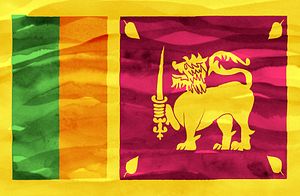Following an election upset that caught most observers off guard, Maithripala Sirisena was sworn in as Sri Lanka’s new president on Friday. Thursday’s election marks the second time the country went to the polls since the end of its civil war in 2009, when previous president, Mahinda Rajapaksa, was re-elected to power.* Further adding to the unexpected result, Rajapaksa conceded defeat to Sirisena almost immediately after official results were released. Given widespread criticism of Rajapaksa’s leadership style as quasi-authoritarian by critics both within Sri Lanka and abroad, expectations were that a result that was unfavorable to his cause would lead to a protracted dispute. As a result, these elections mark a historic milestone in Sri Lanka’s post-civil war experience with democracy.
Sri Lanka’s election commissioner announced early on Friday that Sirisena had obtained 51.28 percent of all valid votes cast in the election, beating Rajapaksa who managed to secure 47.58 percent. Sirisena has been active in Sri Lankan politics for over two decades. According to a Guardian profile, Sirisena, before he was health minister in the Rajapaksa government, was a member of Sri Lankan parliament and a political activist in his youth. His victory in this election is being attributed both to a large minority voter turnout and increased voter perceptions of corruption in the Rajapaksa government. Though Sirisena had broader support among Sri Lanka’s minorities, notably the country’s large Hindu Tamil minority, than Rajapaksa, it remains unlikely that he will initiate any policies that will overtly favor minority interests. Sirisena is also expected to broadly continue the previous government’s economic programs.
The question of post-election stability was answered rather quickly with Rajapaksa’s swift concession of defeat. Additionally, to follow his words with action, early reports suggested that Rajapaksa had vacated his official residence following the announcement of the election result. President press secretary Vijayananda Herath told the media that “the president concedes defeat and will ensure a smooth transition of power, bowing to the wishes of the people.” Post-election security was evidently a concern as the military was placed on standby as Sri Lankans voted on Thursday.
Sirisena’s election marks the beginning of a new political era for Sri Lanka. While Sirisena does remain somewhat of a relative unknown, it is important to note that his victory does not signal a complete departure from Rajapaksa in substance. While Sri Lanka’s minorities supported him, there is nothing immediate in Sirisena’s campaign platform that suggests that he’ll make drastic changes on that front. Indeed, before it was announced that Sri Lanka would hold elections two years ahead of schedule, Sirisena was a member of the Rajapaksa elite. When he left the government in November to stand against Rajapaksa, he emerged as an unexpected threat.
Despite their recent rivalry, Sirisena has said that as president he will ensure that Rajapaksa is shielded from war crimes charges over his alleged role in the conclusion of Sri Lanka’s civil war. Additionally, aware of the possibility of violence, his post-election conduct toward his opponent has been courteous. Even if Sri Lanka’s general political and economic trajectory doesn’t change massively as a result of this election, Sirisena’s leadership will likely embody a different style — ostensibly one featuring fewer autocratic tendencies than his predecessor.
Sri Lanka’s new president will undoubtedly lead to some important changes in the island nation’s foreign policy, particularly with both India and China. Indian Prime Minister Narendra Modi took to Twitter to announce that he had spoken to Sirisena following the election result: “I spoke to Shri Maithripala Sirisena & congratulated him. I congratulate the people of Sri Lanka on the peaceful & democratic poll process,” he tweeted. Under Rajapaksa, tensions between Indian Tamil legislators and the Sri Lankan government were high. Sirisena’s greater Tamil support in Sri Lanka may lead to better relations between the two countries.
The election result, meanwhile, is irksome for Beijing which had assumed Rajapaksa as a political constant in Sri Lanka as it worked toward developing its presence in the Indian Ocean. Sirisena, who has made comments hostile to foreign investment in the past, may not be the most receptive to China’s overtures. His election manifesto, for example, contained particularly powerful language to this effect: “The land that the White Man took over by means of military strength is now being obtained by foreigners by paying ransom to a handful of persons.”
Chinese foreign ministry spokesperson Hong Lei congratulated Sirisena on his election win, noting that cooperation between the two countries “has been deepening.” “We hope and we believe the new Sri Lankan government will carry on the friendly policies towards China and lend their support to relevant projects to make sure these projects are successful,” he added.
Sirisena’s election manifesto identifies a fairly egalitarian approach to Sri Lanka’s foreign relations, noting that “Equal relations will be established with India, China, Pakistan and Japan — the principal countries of Asia while improving friendly relations with emerging Asian nations such as Thailand, Indonesia, and Korea without distinction.” Both Beijing and New Delhi will be keen to understand the new Sri Lankan president’s foreign policy vision.
Update: An earlier version of this article stated that Thursday’s election marked the first time Sri Lankans voted since the end of the country’s Civil War. It is actually the second. Rajapaksa was originally elected president in 2005. Following the removal of term limits, he was elected again in 2010.

































